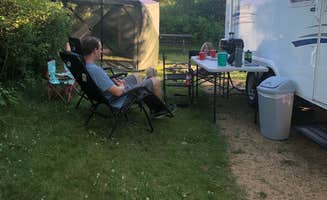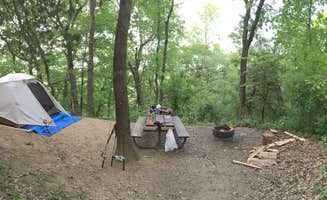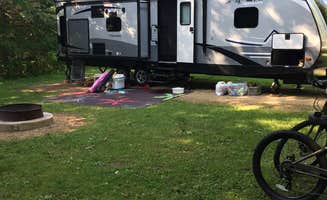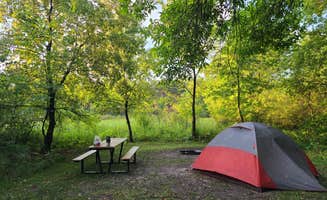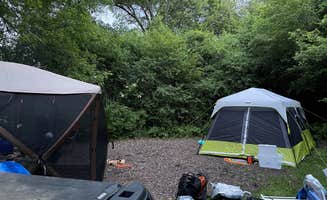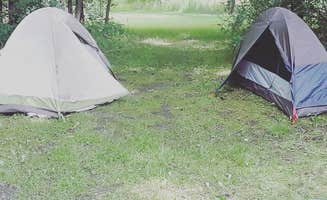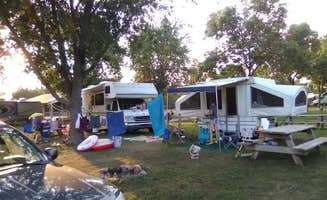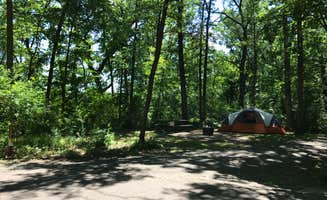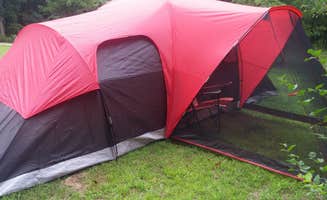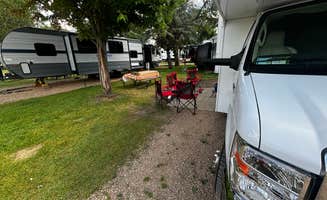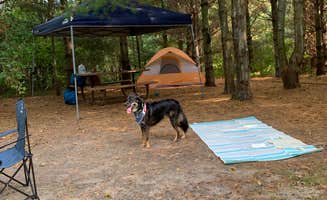Camping spots near Landfall, Minnesota offer four-season accessibility with fewer crowds during spring and fall shoulder seasons. Located in Washington County at an elevation of 930 feet, Landfall sits near the St. Croix River valley where campers can experience seasonal temperature swings from 10°F in winter to 85°F in summer. Most camping areas operate with limited services from November through March.
What to do
Explore freshwater recreation options: At Lake Elmo County Park Reserve, visitors can take advantage of "a home made lake that has a sand bottom but it has chlorine like a pool so no weeds. Great for swimming," according to one camper. The park spans 2,000 acres with two natural lakes plus the swimming pond.
Try archery programs: Several parks offer designated archery ranges for beginners and experienced archers alike. Lake Elmo County Park Reserve features "awesome sites that fit the needs of just about anyone. The have beautiful hiking trails and a swimming beach for the hotter days. They also have an archery range and on Saturday nights they have a campgound program for the kids and families to watch," notes a visitor.
Hike waterfall trails: Exploring the cascade formations provides a cooling activity during summer months. At Willow River State Park Campground, "Willow River falls is definitely a beautiful site to see. Definitely a place to camp if you like to be active and explore the trails. Winter, summer or fall!"
What campers like
Privacy between sites: Many campers appreciate the thoughtful layout at Lebanon Hills Regional Park, where "sites with full hookups or more remote sites with electric that are more tucked away in the pines" provide options for different camping styles. Another reviewer noted that "we liked that we weren't super close to any campers unlike most RV spots are nowadays."
Off-season solitude: Visiting during spring or fall offers significantly more privacy. "My first time solo camping was at William O'Brien State Park on a Sunday evening. Weekends have been packed and reservations scarce for months at state parks in Minnesota. Arriving on a Sunday afternoon was a dream—very few people in the campground loop."
Accessibility to urban amenities: Campers value the proximity to cities while still feeling remote. At Bunker Hills Regional Park, "For being in the middle of the northern suburbs of Minneapolis, this park and campground is surprisingly woodsy, secluded and spacious. There are both primitive (tent) non-electric sites, and sites with electricity, even some 50 amp."
What you should know
Insect management: Summer brings heavy mosquito and fly populations at certain campgrounds. One visitor to Rice Creek Campgrounds reported: "Horseflies nonstop attacked us. To not get bite we had to run around like chickens with our heads cut off! No joke." Plan visits for May, September or October for fewer insect issues.
Reservation timing: Most campgrounds open their reservation windows 120 days in advance, with peak summer weekends filling within hours of availability. Reserve Sunday through Thursday nights for better availability or book during shoulder seasons.
Vehicle permit requirements: Many parks charge separate entrance fees beyond camping fees. Daily vehicle permits typically cost $6-7 while annual permits range from $30-35, depending on the park system.
Firewood regulations: Policies vary by campground with most prohibiting outside wood. One visitor noted that at Rice Creek Campgrounds, "Firewood at $7 a bundle doesn't burn, it just smokes. I asked for a refund. Buy firewood elsewhere."
Tips for camping with families
Chlorinated swimming options: Families with children often prefer the swimming pond at Lake Elmo County Park Reserve. "They have a home made lake that has a sand bottom but it has chlorine like a pool so no weeds. Great for swimming," reports one visitor, making it easier for parents to manage water safety concerns.
Playground proximity: Look for sites near play areas but not so close that noise becomes an issue. At Afton State Park Campground, "There are park pavilions and a water park connected to the campsite, a gold course nearby, and shops, too - - but the actual campsite, bike/walking/horse trails make you forget all of that."
Educational programs: Weekend ranger programs provide structured activities. "On Saturday nights they have a campground program for the kids and families to watch. Very organized and clean facilities. Reasonably priced," notes a Lake Elmo visitor.
Walking distances: Consider site location in relation to bathrooms and water sources. One camper mentioned: "Our site was perfect. The woods made it very secluded. It was close enough to water and bathrooms so it wasn't bad if you planned."
Tips from RVers
Off-peak savings: RVers report significant cost differences between peak and shoulder seasons. Full hookup sites generally cost $10-15 more than electric-only options across the region.
Site length accuracy: Reservation systems may understate actual site capacity. One RVer at St. Croix Bluffs Regional Park noted: "Reservation system is weird and the sites are much bigger than they say. All rv sites are the listed length plus 16' for your tow vehicle, which you need to call to find out."
Dump station timing: Most parks have single-lane dump stations that become congested on Sunday mornings. "When you first pull in to the park there we're an average amount of annoying bugs, especially for an 85 to 90 degree, summer day in a highly vegetative, woodsy park. Staff was not present due to the COVID-19 but we submitted our cash payment and grabbed the site map and park guide and drove to the left to find our camp site."
Power options: RV sites at William O'Brien State Park offer 30-amp service, while Lebanon Hills Regional Park provides 50-amp connections for larger units. "We stayed at site 72 which is at the beginning of the loop. This site isn't as secluded by trees as the other sites and we weren't able to position our pop up to face into the camping spot."


